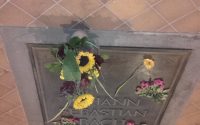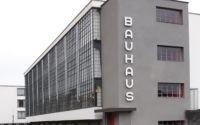The Value of Being Objective
12.09.2017
I made the correct decision to stay in Piła, despite its unattractiveness. It is on a main rail line which is important as a hub, if you have no car. The connections to Wałcz by train are infrequent. I can’t imagine what it would have been like trying to squeeze on the small bus with all that luggage and then trying to call a taxi from the bus station.
At Piła train station now waiting for the train to Bydgoszcz and the connection to Gdańsk. Even though the board clearly indicates that I’m on the correct platform, I still have to ask; and then the platforms in Polish stations are divided into two tracks which even though it’s blindingly obvious that the correct track is the one that the train’s sitting on, I’m still hesitant. I have however got the gist of opening and closing the carriage doors. In a panic, whilst pulling up on the handle and find it doesn’t work, why not try pushing down? It’s so easy really. The carriage is empty and when I find my reserved seat someone is sitting opposite! Why couldn’t they have put me in a seat elsewhere in this empty carriage? She starts talking and then I have to interrupt her and tell her, in Polish, that I do not speak it well (that is the one phrase I’m fluent in). I tell her I’m from Scotland and we begin a conversation by mobile phone. The first sentence she writes is in Gaelic and she is incredulous that I don’t know a word of it and explain why. Laughter! It transpires that she has attended her father’s funeral in Piła and is returning to Warsaw where she works as an accountant. She asks why I’m in Poland and particularly why Piła. I explain why and add that my grandfather too was an accountant for the forestry commission in Wałcz. She has also been to Lviv and remarks that the Ukrainians have not looked after it. She perhaps had a point, but to be fair Ukraine, not being part of the EU, hardly has the funds to make the improvements they would surely like to do.
The wait at Bydgoszcz passes quickly enough as I don’t think about it. The train to Gdańsk is the lap of luxury; massive legroom and really comfortable seats. The hotel is just across the road from the train station but the wall of a dual carriageway bisected by a tram-line bars my way. It seems silly to hail a taxi to go just across the road but then I spy an underpass that any normal person would have noticed and I want to find a mirror to shout at the idiot looking at it.
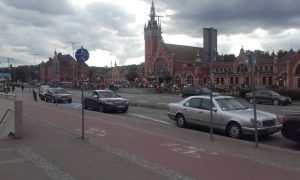
I have arranged to meet Dr.Karol Szejko from Westerplatte Museum tomorrow. This should be an interesting meeting.
It occurs to me that Günther Grass was a native of Gdańsk or Danzig when it was the Free City and he always regarded it as home no matter that it reverted to Poland after WW2.
13.09.2017
The Museum of WW2 where I am to meet Dr. Szejko is not on the battle site as I, for no apparent reason, imagined but in an impressive new deconstructivist style building. Karol Szejko and his colleague, Hanna Mik who is the museum’s coordinator meet me and the entire story unravels and they are fascinated by everything, from my grandfather’s war record to the letters and in particular the sadness they convey, a family’s own tragedy against the backdrop of a wider tragedy and the tensions that emerge reading between the lines of those letters. It’s something I realise that no one in Britain can ever understand and which sections of our agenda-driven media wants to keep hidden. No one on the continent except for the neutral countries escaped unscathed. Even then they had an influx of refugees, much as we have in today’s wars. I just wish that all those war films had not romanticised war, but again the true story is never box office material.
The letter that really excites them is the one Henryk wrote to my father. Hanna wonders if it might be possible to have the originals for exhibition. I have to decline as the letters are a family possession and I would never assent to such a request without discussion among all of us. I feel personally that they are an essential part of family history to be passed on down – but it’s something we as a family, collectively have to decide. I am happy however for the museum to have a copy. The recorded interview has had to be called off as the staff member responsible had to go to Belarus. I have however now established a contact with the museum which I would like to continue and I will suggest to my sister, Maureen, that she might like to make a visit here, perhaps with the original letters.
A question I have is that as Henryk Sucharski was eight years younger than my grandfather he must have risen through the ranks very quickly. He was, it seems, a member of the Polish secret service which maybe does not sound as sinister as it seems as Poland was virtually surrounded by potential enemies and had ongoing territorial disputes with Germany, Czechoslovakia and Lithuania as well as the major one with the USSR. Only Romania was regarded as friendly.
I am presented with a couple of small keepsakes and a copy of a book about Westerplatte and then visit the exhibits of artifacts found below the ground of the battle site – coins, badges, bullets etc and a shattered window with the broken astragals still in place.
I also receive a free pass to WW2 exhibit. I thought I had seen everything there was to see but this is something else with footage that makes the eyes boggle. It holds nothing back and tells it as it was including even the Polish connivance with Germany to annexe a part of Czechoslovakia whilst the Nazis were annexing Austria and the the Sudetenland. It paints the victim’s story regardless of nationality. It traces the origins of WW2 back to WW1 and its aftermath when newly independent countries sprung up, all fighting among each other as centuries old grievances boil over into armed conflict. What it says is that WW1 did not end in central and eastern Europe, with the November Armistice of 1918 There is no triumphalism, no glorification, just the futility of war. It’s far more poignant than anything I’ve seen in Britain. We gloss over things which show us in a bad light. Some historians have recently painted Churchill as having sold Poland out. This is true – in hindsight. But have they ever considered things from the perspective of the people who were there? Churchill certainly did that and probably with a heavy heart but had he a choice when faced with the urgency of defeating Hitler and keeping Stalin on board? Stalin was pressing the British and the Americans to open a second front, that in 1943 they were unprepared for. War history is difficult to study objectively but I believe it to be the only way if future generations are to learn lessons. Decisions made in the cauldron of war, seem inexcusable in peacetime. The value of objectivity cannot be overestimated. Patriotism, in my view, whilst defined as love of one’s country, has to include acceptance of the darker side of a country’s history. Since the dawn of history invaders have always relied on collaborators to maintain occupation. Poland was no different but to a lesser extent, what I would like to call indirect collaboration. While it suffered immeasurably under Nazi occupation, there was still a minority of anti-Semites, ready to betray their fellow Poles, who happened to be of the Jewish faith. ¹

I really don’t think I can ever watch anything else about what happened during WW2. I believe I understand it all to well now and I felt sickened and enlightened simultaneously.
I have my photograph taken for the museum’s website; so, famous after all these years.
On a completely different note, it seems that with my background I can apply and get permanent residence status in Poland, Maureen too and all our offspring. This is encouraging in light of the situation over Brexit. It means that our travel in Europe will be easier with a residency ID card.
14.09.2017
Westerplatte today – definitely now that I have the buses figured out………well almost. I had visited Westerplatte before in 1967,but I had not realised its significance. Only when I returned home then did my father tell me about Major Henryk Sucharski and the battle fought there under his command of the Polish forces. I have no memory at all of that first visit except for a bullet-ridden bunker. Westerplatte is in no way as I remember it. It had been a spa town before it was awarded to Poland in 1918 as a means of accessing the sea. It consists mostly of trees with military fortifications concealed within. Although Westerplatte and the surrounding area were predominantly German, Poland administered the post offices and all the other utilities. The Germans had objected to this, unsuccessfully, in 1918 and hated the arrangement. Sitting on a peninsula the Polish garrison was surrounded and was bombarded by sea by the battleship ‘Schleswig-Holstein’, so their situation was impossible from the outset. It is courageous that they held out as long as they did and with minimal casualties.
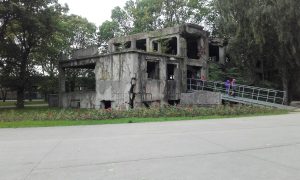
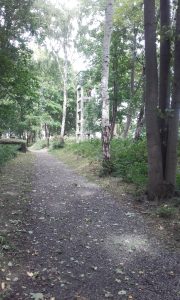
When interrogated after the surrender, the Germans were amazed that the Polish defenders had held out for seven days applauding their tactics of deception and their bravery. Major Sucharski, as a mark of respect was permitted to keep his sabre in captivity. It was however confiscated once he reached the prisoner of war camp. Perhaps the dispatch rider forgot to deliver the message to the prisoner of war camp kommandant.
Today, here I am at the grave of the ‘Hero of Westerplatte’ (see blog dated 14th August 2019). Major Henryk was re-interred here in 1971 from the original burial ground in Naples. Judging from the photographs of the re-internment ceremony, it was carried out with the customary patriotic Polish fanfare. The names of the fallen are remembered and the crucial role played by Captain Franciszek Dąbrowski is finally acknowledged. As with any major sightseeing venue, there are the usual tacky trinkets for sale and the significance of cheap furry toys bears zero relation to what happened here. One thing that raises a chuckle within is the sight of an elderly woman toilet attendant charging 2 złoty entrance fee, sitting eating an apple while Katrina and the Waves ‘I’m Walking on Sunshine’ blared away on the radio.
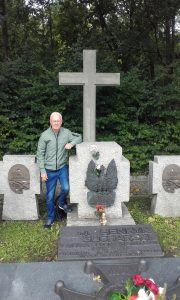
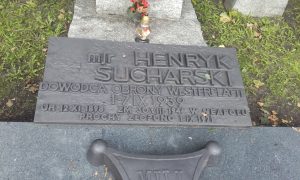
The European Solidarity Museum is a rusty brown monolith, probably an idiom for steelwork and shipbuilding. The exhibition is well laid out and the audio presentation easy to follow. It doesn’t take long to realise that I have now had enough of Solidarność having been exposed to it for most of the 1980’s and beyond. Yes it was the most important vehicle Poland had to get worker rights – job well done. It led to the downfall of totalitarian Bolshevism and for that matter the USSR, which, at the time it seemed, was a good thing for Russia too. Whilst the first riots against the system in the so called Eastern-bloc countries began in East Germany in 1953 and erupted again in Poznań in 1956 followed by Budapest a few months later and again in Prague, all except Poznań were ruthlessly suppressed. In Poland the regime gave a semblance of negotiating with the workers and there was further trouble in the 1970’s in Gdańsk but in fact not much changed. The election of Karol Wojtyła as Pope John Paul II was what in the end brought about the collapse of the system of Soviet style communism as it emboldened Solidarność, having such a prominent figure as a supporter.
However I’m finished with WW2 and the Cold War now unless something significantly different comes to light. For me, the last two days paying respects at the final resting places of my father’s two role models have helped bring closure to that episode of my family history.
The old city of Gdańsk is as I always imagined it to be – in the Hanseatic style – a mixture of Dutch, German and Polish building styles. Even today you can see it must have been a rich trading port. Those merchants did the city proud. New buildings are under construction across the river Motława which feeds the Vistula and you can already see the style will remain. Gdańsk, I would recommend to everyone, whether for sightseeing, history or the mouth-watering cuisine.
The Żuraw restaurant on Długie Pobrzeże, a street that forms an embankment to the river, is an informal setting to enjoy an evening meal – Polish style. The embankment itself is a long pleasant stroll with alleyways leading off which open out into magnificent squares such as the Nowy Targ.
¹ Since this diary entry was made in 2017, the present Polish government has changed the presentation in the Gdańsk War Museum to airbrush the facts and depict the Poles as perennial sufferers. Many millions of Poles profoundly oppose such government meddling. The debate rages on to this day.
End
